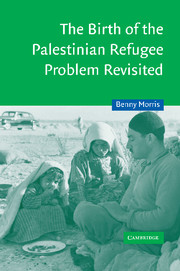Book contents
- Frontmatter
- Contents
- Acknowledgements
- Map 1 The United Nations Partition Plan, November 1947
- Map 2 Arab settlements abandoned in 1948–9
- Map 3 Jewish settlements established in 1948–9
- List of abbreviations
- Introduction to the revised edition
- 1 Background: a brief history
- 2 The idea of ‘transfer’ in Zionist thinking before 1948
- 3 The first wave: the Arab exodus, December 1947 – March 1948
- 4 The second wave: the mass exodus, April–June 1948
- 5 Deciding against a return of the refugees, April–December 1948
- 6 Blocking a return
- 7 The third wave: the Ten Days (9–18 July) and the second truce (18 July–15 October)
- 8 The fourth wave: the battles and exodus of October–November 1948
- 9 Clearing the borders: expulsions and population transfers, November 1948–1950
- 10 Solving the refugee problem, December 1948 – September 1949
- Conclusion
- Appendix 1
- Appendix 2
- Bibliography
- Index
- Titles in the series
Introduction to the revised edition
Published online by Cambridge University Press: 05 June 2012
- Frontmatter
- Contents
- Acknowledgements
- Map 1 The United Nations Partition Plan, November 1947
- Map 2 Arab settlements abandoned in 1948–9
- Map 3 Jewish settlements established in 1948–9
- List of abbreviations
- Introduction to the revised edition
- 1 Background: a brief history
- 2 The idea of ‘transfer’ in Zionist thinking before 1948
- 3 The first wave: the Arab exodus, December 1947 – March 1948
- 4 The second wave: the mass exodus, April–June 1948
- 5 Deciding against a return of the refugees, April–December 1948
- 6 Blocking a return
- 7 The third wave: the Ten Days (9–18 July) and the second truce (18 July–15 October)
- 8 The fourth wave: the battles and exodus of October–November 1948
- 9 Clearing the borders: expulsions and population transfers, November 1948–1950
- 10 Solving the refugee problem, December 1948 – September 1949
- Conclusion
- Appendix 1
- Appendix 2
- Bibliography
- Index
- Titles in the series
Summary
In 1988 CUP published the first edition of this work, which sought to describe the birth of the Palestinian refugee problem that, along with the establishment of the State of Israel, was the major political consequence of the 1948 war. The study examined how and why, over November 1947–October 1950, an estimated 600,000 to 760,000 Palestinian Arabs departed their homes, moving to other parts of Palestine (i.e., the West Bank and Gaza Strip) or abroad, primarily to Jordan, Syria and Lebanon. There are today on the United Nations rolls close to four million Palestinian refugees (the Palestinian Authority says five million). About one third live in so-called refugee ‘camps’, which in reality are concrete-structured slum neighbourhoods on the peripheries of cities (Nablus, Gaza, Ramallah, Beirut, Damascus, Amman, etc.).
Perhaps curiously, little serious historiography had been produced, both in the four decades before the publication of the original version of this book or since, on why and how these Palestinians became refugees. Soon after 1948, several chronicles were published by Palestinian exiles, including ‘Arif al ‘Arif's Al-Nakba, 1947–1952 (the catastrophe 1947–1952) and Haj Muhammad Nimr al Khatib's Min Athar al Nakba (following the catastrophe). About a decade after the event, Walid Khalidi, a Palestinian scholar, published two academic essays, ‘The Fall of Haifa’ and ‘Why Did the Palestinians Leave?’, that shed fresh light on aspects of the subject.
- Type
- Chapter
- Information
- Publisher: Cambridge University PressPrint publication year: 2003

